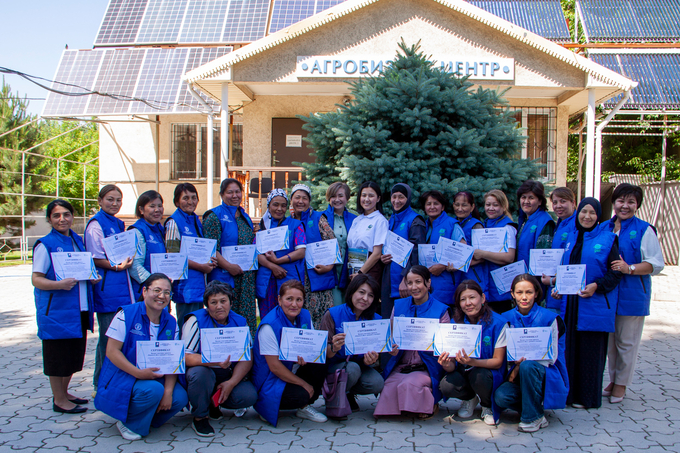May 21, 2025 | 12:28 GMT +7
May 21, 2025 | 12:28 GMT +7
Hotline: 0913.378.918
May 21, 2025 | 12:28 GMT +7
Hotline: 0913.378.918

By empowering rural women with tools and knowledge to undertake agricultural ventures, FAO is promoting equality of opportunity, enhancing women’s economic stability and independence.
The eyes of Aishagul Duganova, a 48-year-old mother of three, light up as she talks about her new greenhouse, which is bringing with it a new stability amidst her family's health problems and money troubles.
In the village of Koram, around 150 kilometers east of Almaty in Kazakhstan, Aishagul's life has been marked by her husband’s debilitating injury and the severe illnesses of her elderly parents-in-law.
With her family completely reliant on her, Aishagul was caught between the demanding care they required and the necessity to earn money; yet she was unable to take advantage of work opportunities too far from home.
Before her husband's accident, Aishagul worked with him in the field, and they sold their produce in local markets. But as his condition worsened, she could no longer leave him alone, pushing the family into a cycle of debt to cover medical expenses and sustain their children.
"Every day, I had to make a choice— care for my sick family or leave them behind to work. It was a choice no one should have to make," Aishagul shares, her voice tinged with the fatigue of years of caregiving.
A turning point came when Aishagul's sister-in-law, aware of her dire situation, introduced her to a greenhouse harvesting training programme. This initiative was part of the broader Food and Agriculture Organization of the United Nations (FAO) project, known as CACILM-2, and funded by the Global Environmental Facility (GEF).
Among its objectives, the project equips rural women in Kazakhstan with the skills and resources to adopt sustainable farming practices and make a living from agriculture. Thanks to the training course provided by FAO’s partner, the Local Community Foundation of Enbekshikazakh District, Aishagul has improved her vegetables and produce-growing skills, allowing her to independently cultivate food.
Pavel Kavunov, an agronomist working at the Foundation, explained the training offered by the project: "We focused on practical, climate-smart agriculture techniques that ensure these women can produce quickly and sustainably.”
He imparted information on the characteristics of seedlings, their root systems and important aspects to consider during planting. “It’s about giving them the tools and the knowledge to succeed on their own terms," he added.
This local expert presence ensures that the women farmers are not only trained but also have continual access to advice and problem-solving techniques, which is vital for the sustainability of their agricultural activities.
FAO also worked with Aishagul and nine other women to install 100 square metre, tunnel greenhouses on their lands. This collaboration has empowered them to cultivate vegetables all year-round in their backyards, opening the door to economic independence and lasting stability.
As the women learn to manage their micro-farms, they are supported by a network of agronomists and coordinators, such as Bakytgul Yelchibayeva, who assist them in connecting with local markets and buyers. "Our goal is to go beyond providing initial support by creating a lasting infrastructure that enables these women to thrive independently,” she explains.
Aishagul is now making the most of her new greenhouse, growing cucumbers and other vegetables to support her family. "This greenhouse has changed everything. It allows me to be with my family when they need me and still provide for them," she explains. Encouraged by her success, Aishagul hopes to build a sustainable farm that also helps other women in her community learn and grow together.
In addition to the greenhouse, the project supported women farmers with tillage materials and cucumber seeds. Together, the women sold 3 992 kilograms of produce, earning roughly double what they would typically make. The boost in income from this extra produce helped improve the lives of 64 people, strengthening their community's farming efforts.
The CACILM-2 project is providing targeted training, resources and coaching to rural communities in Central Asia, addressing several critical barriers such as inadequate job opportunities and lack of information. Moreover, through partnerships with local foundations and experts, participants forge connections with local markets and introduce their products to potential buyers, ensuring a reliable outlet for their produce.
By empowering rural women with the tools and knowledge to undertake agricultural ventures, FAO is promoting equality of opportunity, enhancing their economic stability and independence.
(FAO)

(VAN) Attempts to bring down the price of the Japanese staple have had little effect amid a cost-of-living crisis.

(VAN) Fourth most important food crop in peril as Latin America and Caribbean suffer from slow-onset climate disaster.

(VAN) Shifting market dynamics and the noise around new legislation has propelled Trouw Nutrition’s research around early life nutrition in poultry. Today, it continues to be a key area of research.

(VAN) India is concerned about its food security and the livelihoods of its farmers if more US food imports are allowed.

(VAN) FAO's Director-General emphasises the need to work together to transform agrifood systems.

(VAN) Europe is facing its worst outbreak of foot-and-mouth since the start of the century.

(VAN) The central authorities, in early April, released a 10-year plan for rural vitalization.